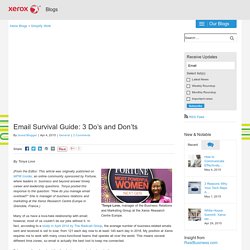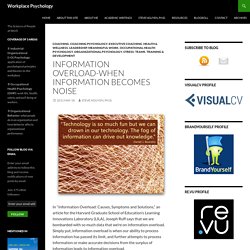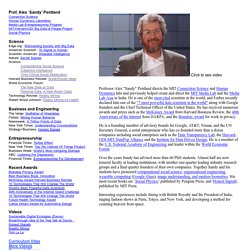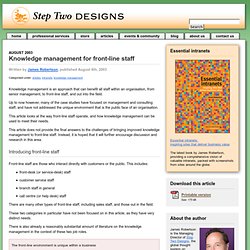

A new way of understanding human behavior based on analysis of Big Data. Email Survival Guide: 3 Do's and Don'ts. By Tonya Love “Tonya Love, manager of the Business Relations and Marketing Group at the Xerox Research Centre Europe.

(From the Editor: This article was originally published on MPW Insider, an online community sponsored by Fortune, where leaders in business and beyond answer timely career and leadership questions. Tonya posted this response to the question: “How do you manage email overload?” She is manager of business relations and marketing at the Xerox Research Centre Europe in Grenoble, France.) Many of us have a love-hate relationship with email; however, most of us couldn’t do our jobs without it. Below are a few of my best tips for staying connected and productive: Know when to take conversations off-line When an email appears to be the start of a lengthy conversation, I pick up the phone and have a real one. Designate a specific time for email I used to keep email notifications on 24/7. End of day wrap-up At the end of each day, I take time to review my entire inbox.
Hate email? Information Overload-When Information Becomes Noise. In “Information Overload: Causes, Symptoms and Solutions,” an article for the Harvard Graduate School of Education’s Learning Innovations Laboratory (LILA), Joseph Ruff says that we are bombarded with so much data that we’re on information overload.

Simply put, information overload is when our ability to process information has passed its limit, and further attempts to process information or make accurate decisions from the surplus of information leads to information overload. Ruff argues that information overload interferes with our ability to learn and engage in creative problem-solving. For instance, venture capitalists with too much information cannot make accurate adjustments to their evaluation process, and because of this their learning is impeded.
“Once capacity is surpassed, additional information becomes noise and results in a decrease in information processing and decision quality…[H]aving too much information is the same as not having enough” (Ruff, 2002, p. 4). Proactive. Anecdote. Honest Signals, Reality Mining, and Sensible Organizations. Click to see video Professor Alex "Sandy" Pentland directs the MIT Connection Science and Human Dynamics labs and previously helped create and direct the MIT Media Lab and the Media Lab Asia in India.

He is one of the most-cited scientists in the world, and Forbes recently declared him one of the "7 most powerful data scientists in the world" along with Google founders and the Chief Technical Officer of the United States. He has received numerous awards and prizes such as the McKinsey Award from Harvard Business Review, the 40th Anniversary of the Internet from DARPA, and the Brandeis Award for work in privacy.
He is a founding member of advisory boards for Google, AT&T, Nissan, and the UN Secretary General, a serial entrepreneur who has co-founded more than a dozen companies including social enterprises such as the Data Transparency Lab, the Harvard-ODI-MIT DataPop Alliance and the Institute for Data Driven Design. He is a member of the U.S. Social Media News and Web Tips – Mashable – The Social Media Guide. Content Management News, Enterprise Content Management, ECM - Fierce Content Management. The Content Economy. Knowledge management for front-line staff. Written by James Robertson, published August 6th, 2003 Categorised under: articles, intranets, knowledge management Knowledge management is an approach that can benefit all staff within an organisation, from senior management, to front-line staff, and out into the field.

Up to now however, many of the case studies have focused on management and consulting staff, and have not addressed the unique environment that is the public face of an organisation. This article looks at the way front-line staff operate, and how knowledge management can be used to meet their needs. This article does not provide the final answers to the challenges of bringing improved knowledge management to front-line staff. Introducing front-line staff Front-line staff are those who interact directly with customers or the public. Front-desk (or service-desk) staff customer service staff branch staff in general call centre (or help desk) staff. Step Two Designs.